 Petzlover
Petzlover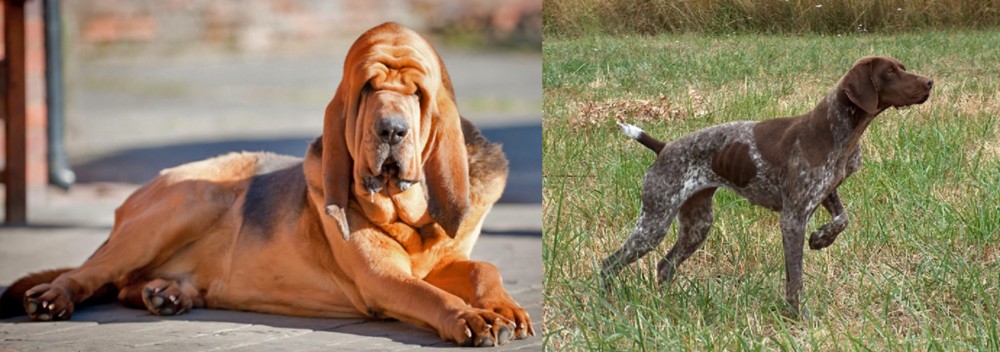 Bloodhound is originated from United Kingdom but Braque Francais is originated from France. Bloodhound may grow 15 cm / 5 inches shorter than Braque Francais. Bloodhound may weigh 17 kg / 38 pounds more than Braque Francais. Bloodhound may live 7 years less than Braque Francais. Bloodhound may have more litter size than Braque Francais. Both Bloodhound and Braque Francais requires Low Maintenance.
Bloodhound is originated from United Kingdom but Braque Francais is originated from France. Bloodhound may grow 15 cm / 5 inches shorter than Braque Francais. Bloodhound may weigh 17 kg / 38 pounds more than Braque Francais. Bloodhound may live 7 years less than Braque Francais. Bloodhound may have more litter size than Braque Francais. Both Bloodhound and Braque Francais requires Low Maintenance.
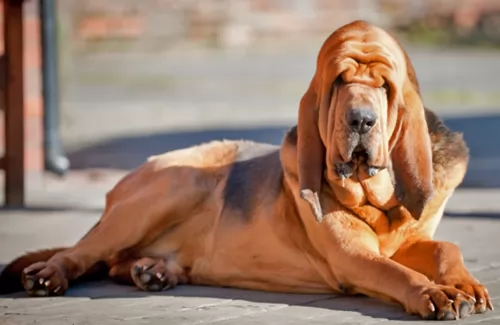 The history of the Bloodhound breed is a fascinating one. Known as a Sleuthhound for its ability to smell out the culprit and bag the prey. Even more so the Bloodhound is known for tracking and finding lost people. He is famous for finding human scents and being able to follow them even days or weeks after the person is lost. They are also able to track people over a great amount of land and have been known to successfully track escaped prisoners or wanted criminals. They are descended from the Saint-Hubert Hounds that were bred at the Abbey/Monastery at Saint-Hubert, Belgium. According to the legends the St. Hubert hounds were bred by the Monks in 1000AD. This hound was thought to be a mixed breed rather than a purebred. That’s because the ancestry of this hound is not really known but it is known that the monks bred them and sent several to the King of France annually. Only black hounds were gifted.
The history of the Bloodhound breed is a fascinating one. Known as a Sleuthhound for its ability to smell out the culprit and bag the prey. Even more so the Bloodhound is known for tracking and finding lost people. He is famous for finding human scents and being able to follow them even days or weeks after the person is lost. They are also able to track people over a great amount of land and have been known to successfully track escaped prisoners or wanted criminals. They are descended from the Saint-Hubert Hounds that were bred at the Abbey/Monastery at Saint-Hubert, Belgium. According to the legends the St. Hubert hounds were bred by the Monks in 1000AD. This hound was thought to be a mixed breed rather than a purebred. That’s because the ancestry of this hound is not really known but it is known that the monks bred them and sent several to the King of France annually. Only black hounds were gifted.
Some kings preferred not to hunt with these hounds thinking them not good enough while others thought the only use for them was as a leash hound. All described the St. Hubert as long in body with short legs. These gifts continued until the French Revolution when hunting in France was greatly reduced until the 19th century. The original St. Hubert strain became extinct in the 19th century and that the current European St. Hubert hound has its origins in the Bloodhound. The Bloodhound as a separate breed was already established in Europe by the middle of the 14th century. They were used as leach hounds to sniff out the prey so that the pack hounds could chase and keep it “at bay”. They were also used from the beginnings of the breed to track humans. At this time they were often known as sleuth hounds. As recorded by John Caius – the authority on Bloodhounds from their origins – writes about the breeds ability to find and track the scent of blood – thus becoming the Bloodhound and its use to track poachers and thieves. He also reported that the Bloodhound and the Sleuth Hound were the same basic breed. The number of Bloodhounds in Britain gradually declined until few remained after World War II. Britain has gradually built their breed back up by importing dogs from America. It was during the 19th century that the Bloodhound was imported into France by breeders who wished to reestablish the St. Hubert Hound. Thus the St. Hubert is both the ancestor and descendent of the Bloodhound. The Britain’s continue to believe that the Bloodhound is a native British breed.
The Bloodhounds in America have had great success as companion animals, with police departments and forest rangers and showing in the prestigious Westminster Kennel Club in New York. There are more Bloodhounds in the United States than anywhere else in the world.
In the end the Anglo-Saxton Bloodhound cannot be specified with any real certainty. Many believe it was not the St. Hubert that the Bloodhound descended from but rather the Norman hound or the sleuth-hound. Many believe it could have included other breeds such as the southern hound, the dun-hound and the Talbot. It cannot be proven today it the Bloodhound’s origins come from Belgian or England.
 Braque Francais was at first one general breed of hounds in the Gascognes and Pyrenees Mountains areas of France. The one breed became two. Known as the Braque Francais Gascognes and the Braque Francais Pyrenees - two separate breeds of very alike dogs. The Gascognes is a lot less common than his smaller brother. Not very much is known about the beginnings of these two strains of Braque Francais as the breed has been around since at least the 15th century. Because the Braque Francais was exported or taken to so many different countries in the 15th-18th centuries, a lot of the origins of the breeds were lost. A major bloodline search was The conducted in the 19th century and found that these were two very distinct breeds of dog.
Braque Francais was at first one general breed of hounds in the Gascognes and Pyrenees Mountains areas of France. The one breed became two. Known as the Braque Francais Gascognes and the Braque Francais Pyrenees - two separate breeds of very alike dogs. The Gascognes is a lot less common than his smaller brother. Not very much is known about the beginnings of these two strains of Braque Francais as the breed has been around since at least the 15th century. Because the Braque Francais was exported or taken to so many different countries in the 15th-18th centuries, a lot of the origins of the breeds were lost. A major bloodline search was The conducted in the 19th century and found that these were two very distinct breeds of dog.
It is known that France was the birthplace of this breed and it was developed because of a need for a tracker that could point, flush and retrieve. The Braque Francais Gascogne probably came from the south of France. It is related to the German Shorthair Pointer and the English Pointer as well. Having existed since the 15th century, he was the father of all pointing dogs in France. By the 17th century the breed had grown enough to be called the “old style Braque Francais”,
Though the origin of the breed is not known there are of course several theories about it. The most prevalent belief is that the Braque Francais Gascogne is a descendent of the Chien d’Oysel, a spaniel breed of medium size and white or brown with brown markings. The Chien d’Oysel is an ancient breed used for hunting prior to the 13th century. Hunters crossed the Chien with local dogs on a routine basis.
Braque Francais came out of these breedings. It was probably French Scent hounds that created the larger size of the Gascogne. This also increased the stamina and strength of the Gascogne as opposed to the Pyrenees. There was also a mixing in of the Grand Bleu De Gasgogne and the Petit Bleu De Gasgogne.
The other prominent theory is that this breed the Gasgogne was actually developed from the Portugese, Spanish and Italian pointers rather than the French dogs. These dogs originated not with the Chien d’Oysel but with the scent hounds. From these dogs came the Spanish and English Pointers. All that is truly known is that all of these types of dogs were present in Europe by the fifteenth century and were moved among countries and cross bred regularly. However in the part of France called the Central Pyrenees region and in a small southern part of France the original, old style Braque Francais was pure bred. This aspect of the breed contributed to the development of all of the French pointers and European shorthaired dogs. By the end of the 1800’s today’s breed was developed.
In 1850 the first Braque Francais breed club was established and in the breed standards for both dogs followed in 1880. They were then registered in the French Kennel Club and the International Kennel Club (FCI). The French Kennel Club does not allow dogs with any common ancestors in Generations 1-3 into the Club in order to keep out the practice of inbreeding. In Canada only the Gascogne is recognized and the United States’ United Kennel Club (UKC) recognizes both. The American Kennel Club (AKC) does not recognize either.
With most local regions and countries choosing their local dogs over other breeds, the Braque Francais Gascogne has become fairly rare outside of France where the breed was the most popular gun dog throughout the 1700’s. The Gascogne was mostly a dog of the hunting nobility because of its size and food needs. Following the French Revolution, the breed fell off dramatically, while the smaller Pyrenees continued to thrive. This was because in the Pyrenees Mountains and the Southwestern region of Gascony, the English Pointer never supplanted the Braque Francais.
The Second World War was brutal to the Braque Francais Gascognes and as it recovered it became much less common than its sister breed. Today it is found almost exclusively in France.
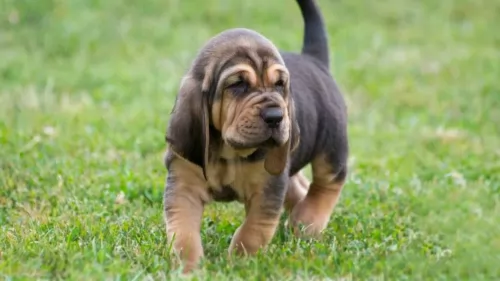 When being judged for confirmation in a show ring, the preference is for a larger dog, with an unusual skeleton in respect to its large size and heavy weight in the bones. They have a narrow head, flat at the sides, but long. They have deep set eyes buried in the deep, long face and wrinkles. The eyes might be yellow or run the gamut to deep hazel depending upon the color of the dog. The long velvety ears and thin and low set on the head. These long ears are as much a part of the Bloodhounds Olfactory system as his amazing nose. They curl backward and inward as the ends. There is a large amount of loose skin on the head and at the jowls. When the Bloodhound lowers his head the loose folds and ridges of skin are prominent on the face and forehead.
When being judged for confirmation in a show ring, the preference is for a larger dog, with an unusual skeleton in respect to its large size and heavy weight in the bones. They have a narrow head, flat at the sides, but long. They have deep set eyes buried in the deep, long face and wrinkles. The eyes might be yellow or run the gamut to deep hazel depending upon the color of the dog. The long velvety ears and thin and low set on the head. These long ears are as much a part of the Bloodhounds Olfactory system as his amazing nose. They curl backward and inward as the ends. There is a large amount of loose skin on the head and at the jowls. When the Bloodhound lowers his head the loose folds and ridges of skin are prominent on the face and forehead.
For many centuries all different colors of Bloodhounds could be found. Today however they are pretty much red, black and tan and black and liver. The Bloodhound is a powerful dog and is larger than most breeds of hounds.
 The Braque Francais Gascogne is a larger dog than the Pyrenees breed and is a very handsome dog. Both have a deep chest, a solid bodies, strong and slender legs and are well-proportioned. They have padded, round paws and a large brown head with floppy ears. The muzzle is a pointed block and he has a scissors bite, with a black nose and dark or amber eyes. The eyes are very expressive and round. The tail can be straight and long, or it can be docked. They are tall and athletic.
The Braque Francais Gascogne is a larger dog than the Pyrenees breed and is a very handsome dog. Both have a deep chest, a solid bodies, strong and slender legs and are well-proportioned. They have padded, round paws and a large brown head with floppy ears. The muzzle is a pointed block and he has a scissors bite, with a black nose and dark or amber eyes. The eyes are very expressive and round. The tail can be straight and long, or it can be docked. They are tall and athletic.
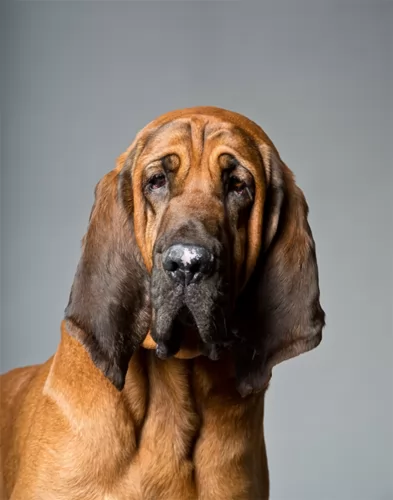 The Bloodhound is known as a gentle soul and he truly is. They are affectionate and gentle with people and children. However, their strong will to track can make them stubborn and hard to handle and train. They are easy going dogs and really like to be with people, children and other dogs. They are affectionate but tend to be set in their ways.
The Bloodhound is known as a gentle soul and he truly is. They are affectionate and gentle with people and children. However, their strong will to track can make them stubborn and hard to handle and train. They are easy going dogs and really like to be with people, children and other dogs. They are affectionate but tend to be set in their ways.
 This is a working breed, but they are nevertheless friendly and loyal to their families. They want to please their people and are usually docile. They love kids and are good as a first ever dog. They are friendly and even-tempered. They tolerate people they do not know but can be shy and are not guard dogs. instead they are loving, affectionate and people oriented. They need to be with their families and never left outside alone. They can develop separation anxiety.
This is a working breed, but they are nevertheless friendly and loyal to their families. They want to please their people and are usually docile. They love kids and are good as a first ever dog. They are friendly and even-tempered. They tolerate people they do not know but can be shy and are not guard dogs. instead they are loving, affectionate and people oriented. They need to be with their families and never left outside alone. They can develop separation anxiety.
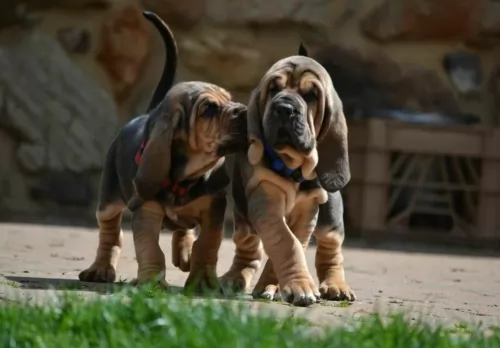 Obviously with ears like the Bloodhound there is always a chance for problems and serious infections. The ears need to be cleaned daily. Because their coat is so thick, they can overheat easily, and they are very prone to bloat, as are many large animals. However, with the Bloodhound, Bloat is the number one killer. Their lifespan is one of the shortest of all dogs at 6.75 years.
Obviously with ears like the Bloodhound there is always a chance for problems and serious infections. The ears need to be cleaned daily. Because their coat is so thick, they can overheat easily, and they are very prone to bloat, as are many large animals. However, with the Bloodhound, Bloat is the number one killer. Their lifespan is one of the shortest of all dogs at 6.75 years.
 The Braque Francais is a fairly healthy breed. They are susceptible to certain health conditions that most dogs of their size and working history are susceptible to. These include Patellar luxation which seems to be one of the most common problems for them. They also can have hip and/or elbow dysplasia, aortic stenosis which is a narrowing of the aorta, and some eye issues such as ectropion, entropion, and PRA (Progressive Retinal Atrophy as well as cataracts.
The Braque Francais is a fairly healthy breed. They are susceptible to certain health conditions that most dogs of their size and working history are susceptible to. These include Patellar luxation which seems to be one of the most common problems for them. They also can have hip and/or elbow dysplasia, aortic stenosis which is a narrowing of the aorta, and some eye issues such as ectropion, entropion, and PRA (Progressive Retinal Atrophy as well as cataracts.
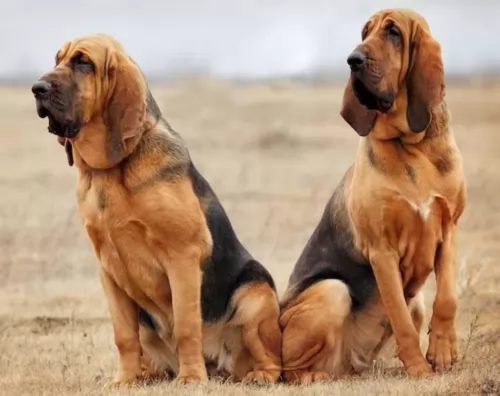 The Bloodhound is not a high energy, fast moving dog but that does not mean he doesn’t have serious nutritional needs. An overweight Bloodhound is on a course to an early demise. They should be fed a high-quality food once a day or split into two daily servings. Do not feed them right before or right after strenuous exercise and remember that strenuous exercise for a Bloodhound is considerably less than it is for a terrier.
The Bloodhound is not a high energy, fast moving dog but that does not mean he doesn’t have serious nutritional needs. An overweight Bloodhound is on a course to an early demise. They should be fed a high-quality food once a day or split into two daily servings. Do not feed them right before or right after strenuous exercise and remember that strenuous exercise for a Bloodhound is considerably less than it is for a terrier.
As previously mentioned the number one cause of death in Bloodhounds is Bloat. They are also prone to cancer. They have minor issues with their eyes, but their ears and skin are also major concerns. Clean the ears daily and wipe out the skin folds and wrinkles to prevent infections. They should be test for hip and elbow dysplasia simply because they are large dogs, though these conditions are less common in Bloodhounds.
Though the Bloodhound is known as a couch potato his stamina and activity levels are usually greatly underestimated. He can follow a scent for 7-10 hours over miles of terrain with out a problem. He needs daily exercise such as long walks on a leash. Do not take your Bloodhound out off leash because if he picks up a scent and wanders off you will not be able to get his attention to call him back.
 This is a high energy, working dog with a need for a high-quality energy food or raw food that you make up yourself. Be sure to include chicken, beef and fish. Feed him about 3 cups once a day or 1.5 cups twice a day.
This is a high energy, working dog with a need for a high-quality energy food or raw food that you make up yourself. Be sure to include chicken, beef and fish. Feed him about 3 cups once a day or 1.5 cups twice a day.
In addition to the conditions listed above, his long floppy ears can lead to ear infections if not cared for. Wash them out daily. He is also susceptible to bloat so don’t feed him large meals and don’t let him exercise or work right before or right after exercise.
These dogs have a variety of hunting skills. They are not only pointers but can flush, trail and retrieve. The Gascogne is not as quick as the Pyrenees. They need a lot of exercise daily or they need a hunting job. They would do well with barn hunt, lure coursing and free play in an off leash fenced in area. If they don’t get rid of their energy, they can be destructive. They were bred to hunt and cannot resist the chase,